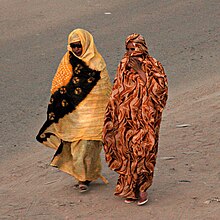 Women in Atar, Mauritania, 2006 | |
| General Statistics | |
|---|---|
| Maternal mortality (per 100,000) | 510 (2010) |
| Women in parliament | 25% (2017)[1] |
| Women over 25 with secondary education | 8.0% (2010) |
| Women in labour force | 32% (2017)[2] |
| Gender Inequality Index[3] | |
| Value | 0.632 (2021) |
| Rank | 161st out of 191 |
| Global Gender Gap Index[4] | |
| Value | 0.606 (2021) |
| Rank | 145th out of 156 |
| Part of a series on |
| Women in society |
|---|
 |
Issues impacting Women in Mauritanian society include female genital mutilation,[5] child marriage,[6] and polygamy.[7]
The practice of Leblouh (Arabic: البلوح, romanized: lə-blūḥ) is the practice of force-feeding girls from as young as five, through to teenagers, in Mauritania, Western Sahara, and southern Morocco, where obesity is traditionally regarded as being desirable.[8][9][10]
Older women called "fatteners" force the young girls to consume enormous quantities of food and liquid,[11] inflicting pain on them if they do not eat and drink. One way of inflicting pain is to pinch a limb between two sticks. A six-year-old girl might typically be forced to drink 20 litres (4.4 imp gal; 5.3 US gal) of camel's milk, and eat two kilos of pounded millet mixed with two cups of butter, every day. Although the practice is abusive, mothers claim there is no other way to secure a good future for their children.[11][12]
The practice goes back to the 11th century, and has been reported to have made a significant comeback in Mauritania after a military junta took over Mauritania in 2008.[11]
- ^ "Proportion of seats held by women in national parliaments (%) | Data".
- ^ "Labor force participation rate, female (% of female population ages 15-64) (Modeled ILO estimate) | Data".
- ^ "Human Development Report 2021/2022" (PDF). HUMAN DEVELOPMENT REPORTS. Retrieved 22 December 2022.
- ^ "Global Gender Gap Report 2021" (PDF). World Economic Forum. Retrieved 22 June 2022.
- ^ Female Genital Mutilation in Mauritania Archived 2013-10-03 at the Wayback Machine Federal Ministry of Economic Cooperation and Development, Germany (September 2011)
- ^ Chata Malé; Quentin Wodon (March 2016), BASIC PROFILE OF CHILD MARRIAGE IN MAURITANIA (PDF), World Bank Group
- ^ "Mauritania |".
- ^ Popenoe, Rebecca. 2004. Feeding Desire: Fatness, Beauty, and Sexuality among a Saharan People. New York: Routledge. ISBN 978-0415280969.
- ^ "body | Savage Mind body | An outsider's ethnographic blog on Toronto and beyond". Retrieved 2021-12-29.
- ^ LaFRANIERE, SHARON. In Mauritania, Seeking to End an Overfed Ideal, The New York Times, published on July 4, 2007. Accessed on June 30, 2011.
- "Girls as young as 5 and as old as 19 had to drink up to five gallons of fat-rich camel’s or cow’s milk daily, aiming for silvery stretch marks on their upper arms. If a girl refused or vomited, the village weight-gain specialist might squeeze her foot between sticks, pull her ear, pinch her inner thigh, bend her finger backward or force her to drink her own vomit. In extreme cases, girls die, due to a burst stomach. The practice was known as gavage, a French term for force-feeding geese to obtain foie gras."
- ^ a b c Smith, Alex Duval. Girls being force-fed for marriage as junta revives fattening farms, The Observer, March 1, 2009.
- ^ Young Mauritanians reject forced fattening, Al Arabiya, February 24, 2009.